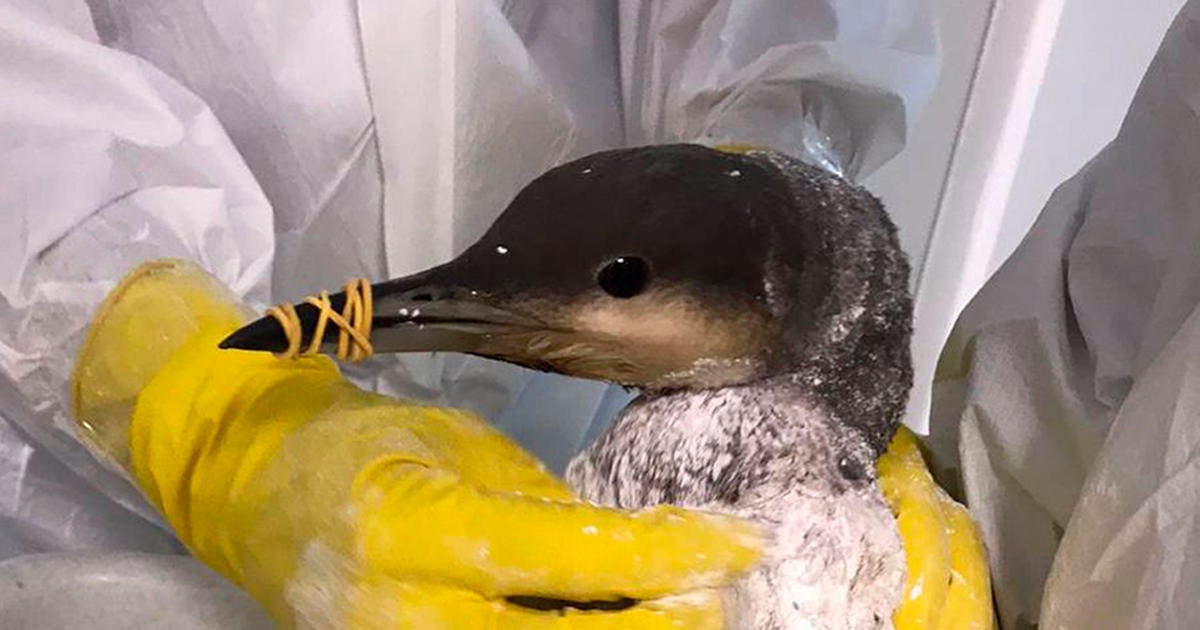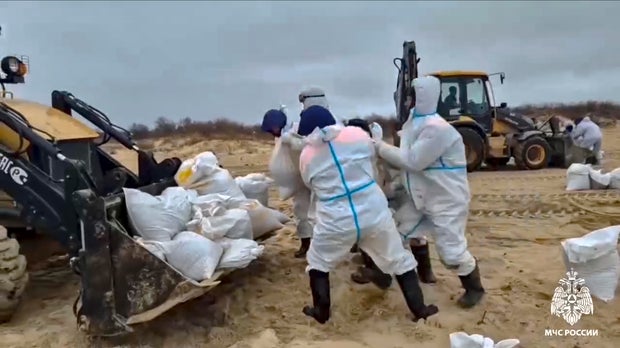Thirty-two dolphins have died since fuel oil spilled out of two storm-stricken tankers three weeks ago in the Kerch Strait, which separates the Russia-occupied Crimean Peninsula from Russia’s southern Krasnodar region, an animal rescue group said Sunday.
Russia’s Delfa Dolphin Rescue and Research Center said the deaths are “most likely related to the fuel oil spill.”
The center said on the messaging app Telegram that a total of 61 dead cetaceans – an order of aquatic mammals that includes whales and dolphins – had been recorded since the emergency, but the condition of the bodies suggested that the 29 others had died before the spill.
“Judging by the condition of the bodies, most likely the majority of these cetaceans died in the first 10 days after the disaster. And now the sea continues to wash them up,” the center wrote, noting that most of the dead dolphins were from the endangered Azov species.
Russia’s Emergencies Ministry said Sunday that over 96,000 tons of contaminated sand and soil had been removed by officials and volunteers along the shoreline of the Krasnodar region’s Anapa and Temryuk districts.
The ministry said it was working to clean up after the incident, but that “strong winds and waves” had thrown oil onto some beaches.
/ AP
“More than 68 kilometers of coastline have been cleaned,” it said.
In a further statement Sunday, the ministry said two new oil slicks had been discovered.
One was off the seaside resort of Anapa and the other in the bay of Kapsel, it said in a statement cited by the Russian news agency TASS.
The news agency said the second slick was two kilometers long.
The type of fuel oil involved in the incident is particularly hard to clean because it is dense and heavy and does not float on the surface, Russian authorities say.
Russia-appointed officials in Moscow-occupied Crimea announced a regional emergency on Saturday after oil was detected on the shores of Sevastopol, the peninsula’s largest city some 250 kilometers (155 miles) from the Kerch Strait.
On Dec. 23, the ministry estimated that up to 200,000 tons in total may have been contaminated with mazut, a heavy, low-quality oil product.
Russian President Vladimir Putin has called the oil spill an “ecological disaster.”
The Kerch Strait is an important global shipping route, providing passage from the inland Sea of Azov to the Black Sea.
It has also been a key point of conflict between Russia and Ukraine after Moscow annexed the peninsula in 2014. In 2016, Ukraine took Moscow to the Permanent Court of Arbitration, where it accused Russia of trying to seize control of the area illegally. In 2021, Russia closed the strait for several months.
Mykhailo Podolyak, an adviser to the head of Ukrainian President Volodymyr Zelenskyy’s office, described the oil spill last month as a “large-scale environmental disaster” and called for additional sanctions on Russian tankers.
/ AP
Oil spills have impacted marine life in recent years. Last year, an oil spill that leaked more than 34,000 gallons out in a southern Louisiana bayou killed at least 17 aquatic salamanders and three turtles while three ducks and three alligators were reported to have been covered in oil.
In 2022, a massive diesel spill killed thousands of animals near New Orleans. The year before that, Louisiana wildlife officials said they documented more than 100 oil-soaked birds after crude oil spilled from a refinery flooded during Hurricane Ida.
In 2020, at least 38 dead dolphins washed ashore on the island of Mauritius in the aftermath of a massive oil spill from a Japanese ship.
Agence France-Presse contributed to this report.
Grub5



